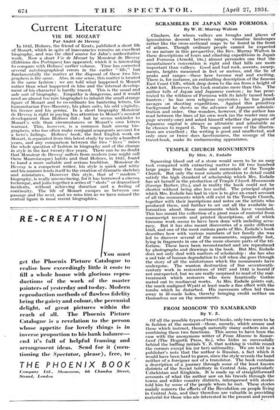Current Literature
VIE DE MOZART Par Andre de Hevesy
In 1845, Holmes, the friend of Keats, published a short life of Mozart, which in spite of inaccuracies remains an excellent biography, and was the chief source for Jahn's authoritative work. Now a short l'ie de Mozart by Monsieur de Hevesy (Editions des Portiques) has appeared, which it is interesting to compare with Holmes' earlier volume. Time has corrected several autobiographical errors in the earlier " life," but fundamentally the matter at the disposal of these two bio- graphers is the same. Also, in one sense, this matter is treated in the same fashion : we are told what happened to Mozdrt rather than what happened in him and the internal develop- ment of his character is hardly traced. This is the usual and safe sort of biography. Empathy is dangerous, and it would need an almost too rare biographer to inhabit the small strange figure of Mozart and to co-ordinate his bantering letters, his humanitarian Free-Masonry, his plum suits, his odd virginity, his licence and his genius. In a short biography Monsieur de Hevesy is right in paying less attention to Mozart's musical development than Holmes did ; but he seems unkinder to Mozart's wife than circumstances or Mozart's own letters warrant. This, however, is a common fault among bio- graphers, who too often make conjugal scapegoats account for a hero's failings. Holmes' book, the first English work on Mozart, is separated from this latest study by nearly a hundred years, and any comparison between the two " lives " raises the whole question of fashion in biography and of the change in style in the last twenty-five years. There can be no doubt
that Monsieur de Hevesy suffers from modern (one might call them Mauroisesque) habits and that Holmes, in 1845, found to hand a more suitable and serious tradition. Monsieur de Hevesy is a competent writer, his style is quick and witty and his manner lends itself to the creation of dramatic sketches and miniatures. However this style, that of " modern " biography, is really unconvincing, for it has borrowed a cinema technique, and joins together a series of " shots" or dramatized incidents, without achieving duration and a feeling of continuity. The life of Mozart escapes us between one passage and the next, and we miss him as we have missed the central figure in most recent biographies.












































 Previous page
Previous page